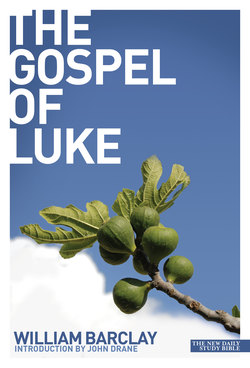Читать книгу Gospel of Luke - William Barclay - Страница 28
На сайте Литреса книга снята с продажи.
ОглавлениеJOHN’S SUMMONS TO REPENTANCE
Luke 3:7–18
To the crowds who came out to be baptized by him, John used to say, ‘You spawn of vipers, who put it into your heads to flee from the coming wrath? Produce fruits to match repentance. Do not begin to say among yourselves, “We have Abraham as our father.” I tell you that God is able to raise up children to Abraham from these stones. Even now the axe is laid at the root of the trees. Every tree that does not bear good fruit is cut down and thrown into the fire.’ The crowds asked him, ‘What are we to do?’ He answered them, ‘Let him who has two robes give one to one who has none and let him who has food do likewise.’ The tax-collectors came to be baptized and said to him, ‘Teacher, what are we to do?’ He said to them, ‘Exact no more beyond what your instructions lay down.’ The soldiers, too, asked him, ‘What are we to do?’ He said to them, ‘Treat no man with violence and do not play the false informer and be content with your pay.’
When the people were in a state of expectancy and when they were all wondering in their hearts about John, as to whether he could be the Anointed One, John answered them all, T baptize you with water, but the One who is stronger than I is coming, the latchet of whose sandals I am not worthy to unloose. He will baptize you with the Holy Spirit and with fire. His winnowing fan is in his hand to cleanse his threshing-floor and he will gather the corn into his store but he will burn the chaff with unquenchable fire.’
HERE we have the message of John to the people. Nowhere does the difference between John and Jesus stand out so clearly because, whatever the message of John was, it was not a gospel. It was not good news; it was news of terror.
John had lived in the desert. The face of the desert was covered with stubble and brushwood, as dry as tinder. Sometimes a spark set the face of the desert alight and out from their crannies came the vipers, scurrying in terror from the menacing flames. It was to them John likened the people who came to be baptized.
The Jews had not the slightest doubt that in God’s economy there was a favoured-nation clause. They held that God would judge other nations with one standard but the Jews with another. They, in fact, held that they were safe from judgment simply by virtue of the fact that they were Jewish. Children of Abraham were exempt from judgment. John told them that racial privilege meant nothing; that life not lineage was God’s standard of judgment.
There are three outstanding things about John’s message.
(1) It began by demanding that people should share with one another. It was a social gospel which laid it down that God will never absolve anyone who is content to have too much while others have too little.
(2) It ordered people, not to leave their jobs, but to work out their own salvation by doing those jobs as they should be done. Let the tax-collector be a good tax-collector; let the soldier be a good soldier. People had a duty to serve God where God had set them.
In the words of a spiritual:
There’s a king and captain high,
And he’s coming by and by,
And he’ll find me hoeing cotton when he comes,
You can hear his legions charging in the regions of the sky,
And he’ll find me hoeing cotton when he comes.
There’s a man they thrust aside,
Who was tortured till he died,
And he’ll find me hoeing cotton when he comes.
He was hated and rejected,
He was scorned and crucified,
And he’ll find me hoeing cotton when he comes.
When he comes! when he comes!
He’ll be crowned by saints and angels when he comes,
They’ll be shouting out Hosanna! to the man that men denied,
And I’ll kneel among my cotton when he comes.
It was John’s conviction that there is nowhere we can serve God better than in our daily work.
(3) John was quite sure that he himself was only the forerunner. The King was still to come and with him would come judgment. The winnowing fan was a great flat wooden shovel; with it the grain was tossed into the air, the heavy grain fell to the ground and the chaff was blown away. And just as the chaff was separated from the grain so the King would separate the good and bad.
So John painted a picture of judgment, but it was a judgment which could be met with confidence only by those who had discharged their duty to their neighbour and who had faithfully done their day’s work.
John was one of the world’s supremely effective preachers. Once, the great preacher Thomas Chalmers was congratulated on a sermon. ‘Yes,’ he said, ‘but what did it do?’ It is clear that John preached for action and produced it. He did not deal in theological subtleties but in life.
